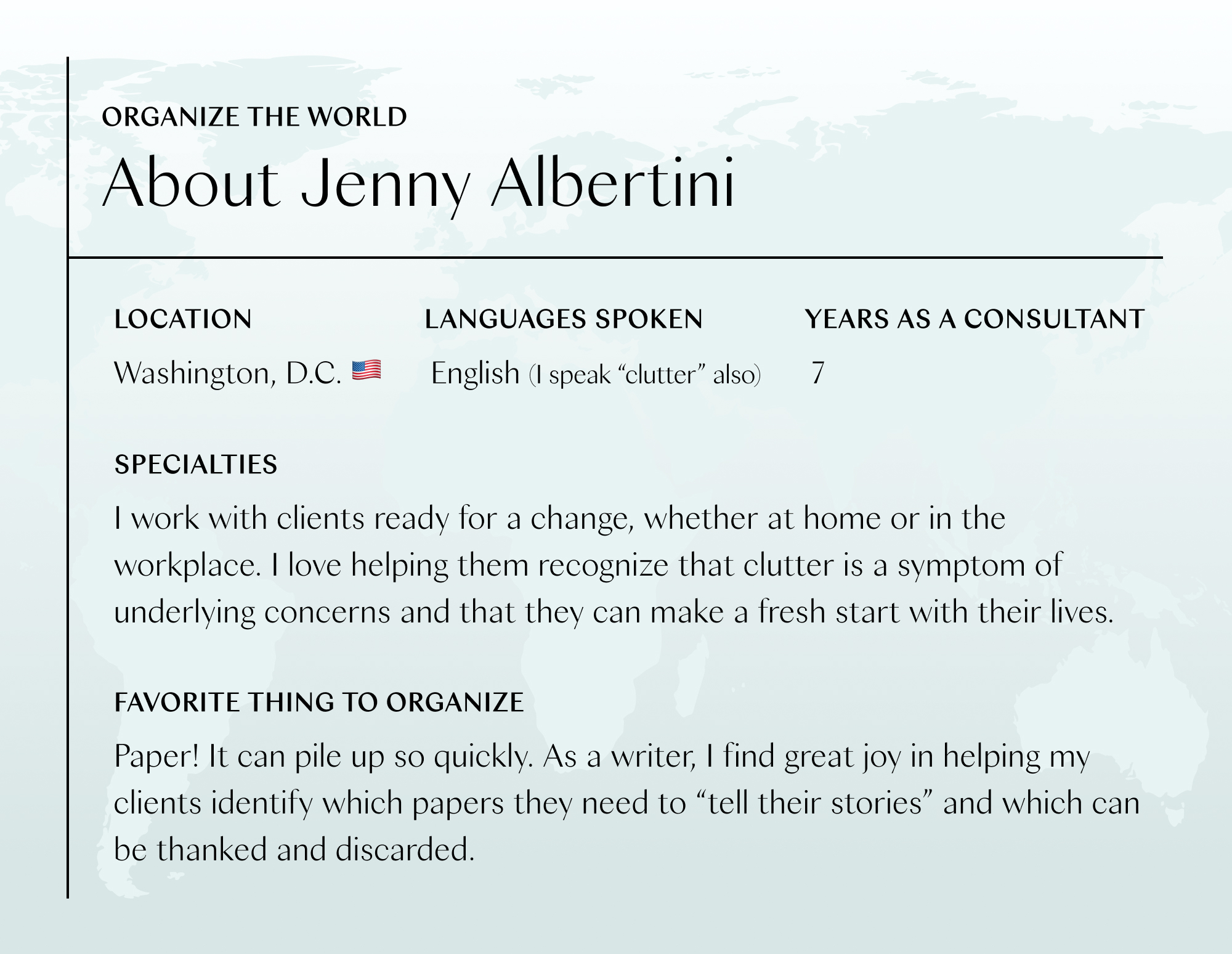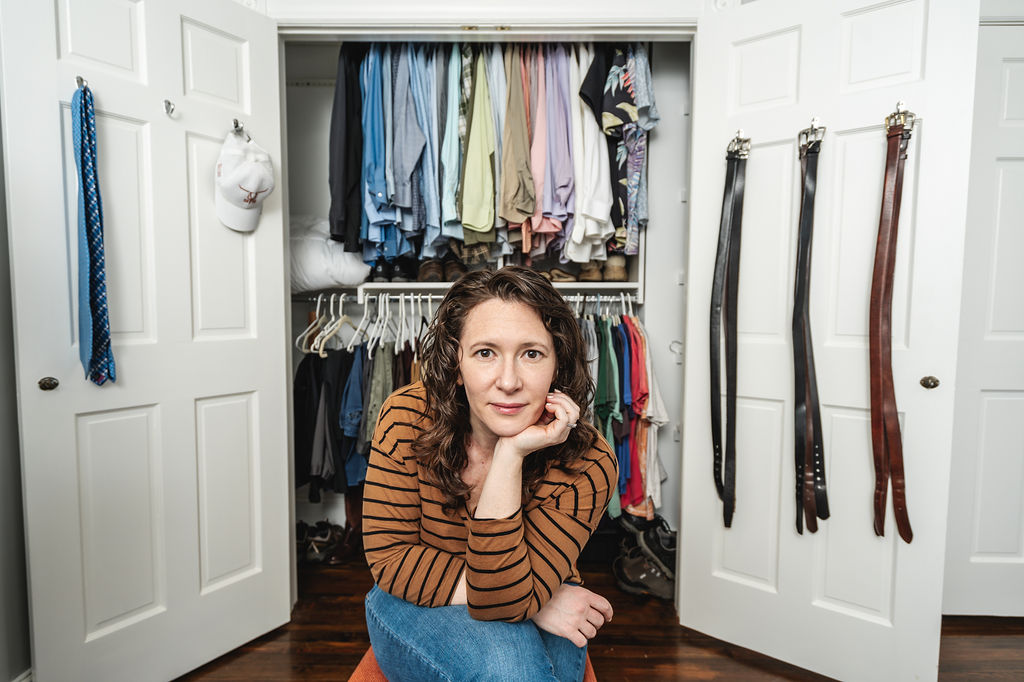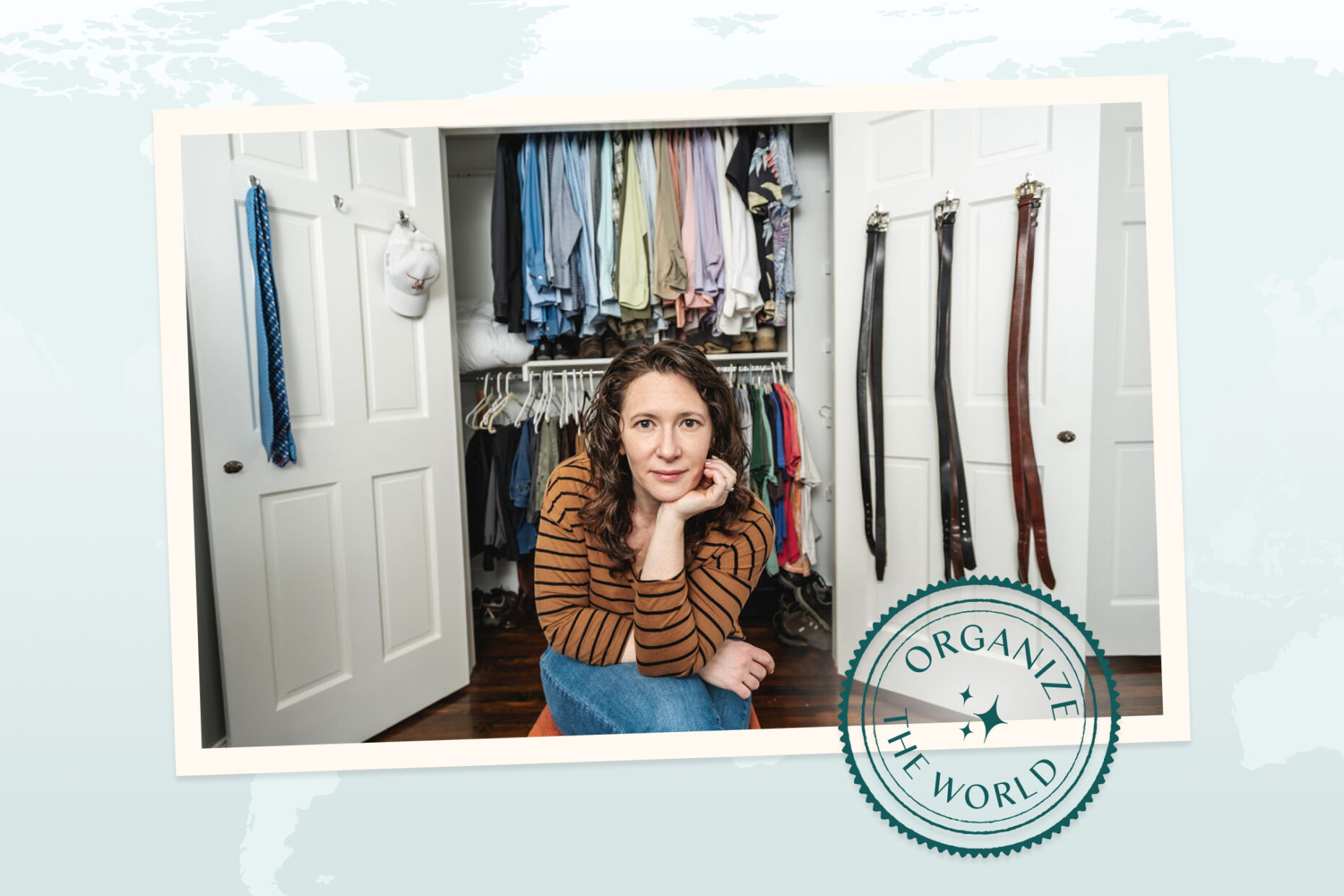This guest column is part of our Organize the World series, in which we feature KonMari Consultants from the many countries (58 and counting!) where they’re changing lives through organizing. We’ve asked them to give us their unique insights into living a more organized life.
Five weeks of piled-up laundry might not be a sign to call the doctor, but according to KonMari Consultant and Master of Public Health, Jenny Albertini, maybe it should be.
Jenny started her career in public health before switching to professional organizing, but she quickly realized the two fields weren’t so different — disorganization was profoundly affecting her clients’ physical and mental health.
Since getting certified in KonMari’s very first Consultant course, Jenny has found ways to combine her two areas of expertise — health and home — to transform clients’ lives and well-being. Those lessons also inspired her to write her forthcoming book Decluttered: Mindful Organizing for Health, Home, and Beyond.
We asked Jenny to share some insights from Decluttered, along with advice from her many years of work as a professional organizer. The timing of this column is also fortuitous — today marks the 7th anniversary of Jenny’s certification as a KonMari Consultant. Cheers!

Before joining Marie Kondo’s first Consultant training course in August 2016, I’d worked in healthcare for nearly two decades. I thought that my organizing life would be a totally different career experience, but once I started spending time with my KonMari clients, I began recognizing how much overlap existed between health issues in their homes and those I saw in clinics and hospitals. There are many ways that clutter can affect our health, and similarly, certain underlying health issues also affect our ability to manage clutter.
These situations can be helped, though. Let’s go through each of these three ways clutter affects health, and you can take away some simple tips to address these issues in your life.
01. Clutter Messes with our Brains
Executive functioning skills are the cognitive processes in our brain that help us complete tasks and meet goals. Starting a decluttering project, completing it, and maintaining the decluttered systems you set up at home require executive functioning.
Our executive functioning skills can ebb and flow depending on many different factors, such as periods of high stress, brain-based conditions (e.g., attention-deficit/hyperactivity disorder (ADHD), depression, anxiety, etc.), and even how well-regulated our limbic system is. The limbic system is the part of our nervous system that manages our motivation and emotions and dictates how the prefrontal cortex handles executive functioning abilities. Struggling with executive functioning skills may indicate an underlying condition affecting your life.
People with executive functioning challenges are more likely to struggle with clutter than people who don’t live with these conditions. Conversely, clutter that feels unmanaged can further weaken executive functioning. Does this sound like you?
How to Strengthen Executive Functioning
01. Look for an “accountability buddy” to work with you, virtually or in person, while decluttering. External accountability can help initiate and sustain a task like decluttering. Hiring a KonMari Consultant can also provide external support along your journey to prioritize and complete tasks.
02. Use mindfulness practices to regulate your nervous system. Any practices that make you more aware of the present moment without judgment will add up. Think meditation, breathing exercises, walking, etc. Regular mindfulness practices, even those that take only a few minutes per day, allow us to widen the window of tolerance for coping with distress and regulating our nervous systems. For instance, decluttering via a mindful technique like the KonMari Method can help regulate our nervous system, mitigating stress and reducing the intensity of fight-or-flight responses.
“Clutter plays a pivotal role in how we experience our environments...The ease of the space will determine the ease you feel moving through life. ”
02. Clutter Harms Relationships
Interpersonal dynamics — at work, in families, and in marriages — spill into closets, kitchens, and living rooms. They also affect our everyday well-being. A disagreement over a disorganized spice drawer can tip into resentment, quickly becoming an argument over who takes on more household responsibility in the relationship. Almost always, when it comes to decluttering, the problem isn’t the clutter; the issues are the habits, constraints, and circumstances in our lives that create the clutter. In a sense, the “stuff” around us becomes the “stuff” in between us and breaks down connections in our relationships.
Because research shows that healthy relationships and social connections directly affect our well-being, not addressing how clutter may affect your relationships can harm your health. Relationships change and strengthen as communication improves; are there any relationships you feel need to address clutter?
How to Address Interpersonal Clutter
Decluttering relationships often requires a delicate balance of compassion, communication, and reflection. Identifying personal goals around clutter is an act of self-compassion, as is trying to inspire others to act in ways more aligned with a decluttered mindset.
If you’re experiencing conflict over clutter with someone in your life, try this journaling exercise. Write down your own answers first. Then, share them with one another without judgment. Frame your discussion around finding shared priorities.
- How do you want to feel in your home?
- What do you want to be able to do there?
- Are there any challenges that exist in our home that interfere with decluttering?
- How can our relationship help us achieve what we want to see, feel, and do in our home?
“Interpersonal dynamics spill into closets, kitchens, and living rooms. They also affect our everyday well-being.”
3. Clutter Overwhelms Our Environment
When our environments are calming, beautiful spaces, we can feel it. Orderly environments create calm and happiness in our lives and allow us to be purposeful with our intentions and actions. The built environment — the structures, facilities, and spaces where we spend our time — influences every person’s relationship to objects, spaces, and each other.
Clutter plays a pivotal role in how we experience our environments. If the layout of our space doesn’t lend itself to efficiently storing and finding items — such as lack of closet space or shelves so high we can’t access them — we are more likely to let clutter build up. The ease of the space will determine the ease you feel moving through life.
Environment also influences how motivated we feel about decluttering in the first place. Remember earlier when we discussed executive functioning? Sunlight helps regulate our mood, energy, and circadian rhythms. Living in a home or area that does not get much sunlight makes you more likely to struggle with executive functioning.
Beyond decluttering by category to reduce the volume of what you own, consider thinking more broadly about your environment. Assessing the spaces where you spend your time can help you determine whether they contribute to your well-being or are a roadblock to your goals.
How to Rethink Your Environment
To complement your KonMari tidying journey, consider setting aside time to reflect on the physical aspects of the environments where you spend your time (homes, workplaces, community settings, etc.).
Use the following checklist from the US Department of Housing and Urban Development (HUD), which defines these eight principles as requirements for a healthy home. Rate your environments on how well they do in each category, and if you are concerned about the results, investigate ways you, your landlords, or managers can make improvements.
- Keep it dry
- Keep it clean
- Keep it safe
- Keep it well-ventilated
- Keep it pest-free
- Keep it contaminant-free
- Keep your home maintained
- Keep your home thermally controlled

Real Change Happens When We Address What Lies Beneath
With this broader understanding of how and why clutter can affect our health, we stand a better chance of dealing with it and minimizing its impact on our lives. For years, I wanted to know how to take this knowledge and let it catalyze more people forward so they could transform their lives.
This article isn’t meant to cover all the ways clutter affects our health or all the opportunities for addressing it, but it is a start. (For more on this topic, pre-order my first book Decluttered: Mindful Organizing for Health, Home and Beyond.)
Although health issues sometimes feel daunting, I want to convey what you can do about this complicated, fascinating relationship between clutter and health. By naming and digging into these in more detail, we can increase empathy and broaden awareness about what’s happening behind the clutter. This awareness can help us decide which actions will lead to impactful results — and put us on a path to declutter more mindfully for our health, home, and beyond.
Interested in hiring Jenny to help you organize your office or home? Learn more about her work on her site. Her new book, Decluttered, is available for pre-order.








